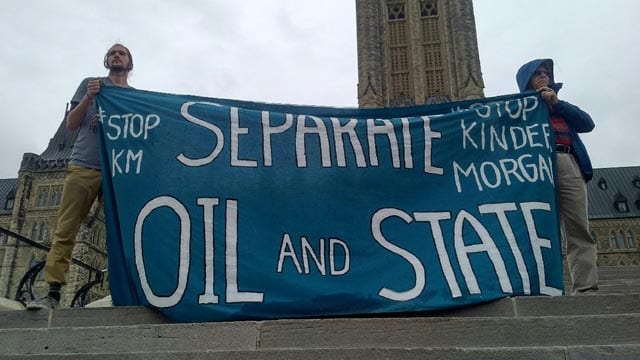
Anti-Trans Mountain Pipeline rally on Parliament Hill May 22, 2018
A new federal government report says it has made a “significant finding” around the impacts of potential delays in the Trans Mountain pipeline expansion’s (TMX) construction and projected in-service date.
On Thursday Ottawa’s Office of the Parliamentary Budget Officer Yves Giroux said Canada’s Dec. 31, 2021 projected in-service date for the project is “very optimistic”.
He said, pending the outcome of the National Energy Board’s current reassessment process, “at least a one year delay” for TMX should be expected — and that would “incur a loss of $700 million”.
A two-year delay would amount to a loss of almost $2.3 billion, Giroux said.
His report, “Canada’s purchase of the Trans Mountain Pipeline — Financial and Economic Considerations,” identifies “delays in pipeline construction, an increase in construction costs and/or changes in the risk profile” of TMX “can negatively influence the final sale price” that Canada can negotiate for the original Trans Mountain pipeline, the yet-to-be-built expansion project, and other assets it purchased from Texas oil company Kinder Morgan last year.
The report comes amid a federal court-ordered halt to project construction and a reconsideration of multiple factors by the National Energy Board, including further consultations with First Nations that would be impacted by the pipeline.
Giroux “assumed a total construction cost of $9.3 billion and an in-service date of December 31, 2021, as quoted in Kinder Morgan Canada Limited’s August 2018 14-A filings,” the report says.
Several First Nations’ legal challenges to the project were consolidated in a Federal Court of Appeal decision that has forced the federal government back to the table to consult with First Nations.
Some First Nations are staunchly opposed to the pipeline and associated risks, despite an opportunity to sign benefit agreements with previous pipeline owner Kinder Morgan.
In December Union of B.C. Indian Chiefs Secretary-Treasurer Kukpi7 Judy Wilson told Prime Minister Justin Trudeau at an Assembly of First Nations special chiefs’ assembly in Ottawa that “there was no consent” on TMX from Secwepemc people, which would run through more than 500 kilometres of their unceded territory.
Similar to arguments made by Wet’suwet’en hereditary leaders against the Coastal GasLink pipeline in northern B.C., Wilson maintains that First Nation band councils don’t have the authority to make decisions impacting unceded lands outside reservations.
“You can’t count a few [Impact Benefit Agreements] with some of the communities as consent because it’s the proper title holders of those nations that hold the title,” she said.
In June Nicole Schabus, an assistant law professor at Thompson Rivers University in Kamloops, told APTN News that when Kinder Morgan suspended non-essential spending they pointed to the province of B.C. for the hold-up.
“But the biggest uncertainty, legal and economic, comes from Indigenous peoples,” she said.
D.T. Cochrane, an economic researcher with the Indigenous Network on Economies and Trade, told APTN that outstanding legal and financial risks make the project “completely untenable”.
He said Canada’s purchase of the pipeline last year is a “perfect example of the socialization of risk,” and that those associated are now “borne by the Canadian government and…all of the citizens of Canada.”
Giroux estimates that the Trans Mountain pipeline and TMX have a combined value between $3.6 billion and $4.6 billion.
The Trudeau government purchased the pipeline, project and assets from Kinder Morgan for $4.5 billion.
Asked if, in light of his assessment, he thinks a private corporation would have bought the pipeline under the same circumstances as Canada did, Giroux said “given the uncertainties and the risks…probably not.”










